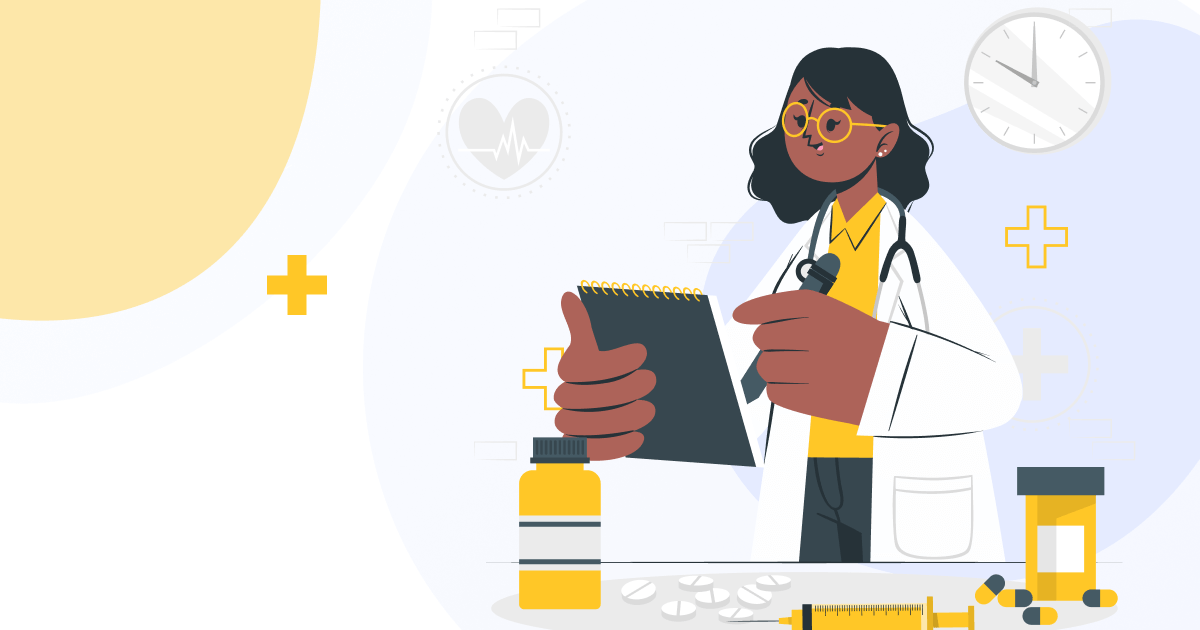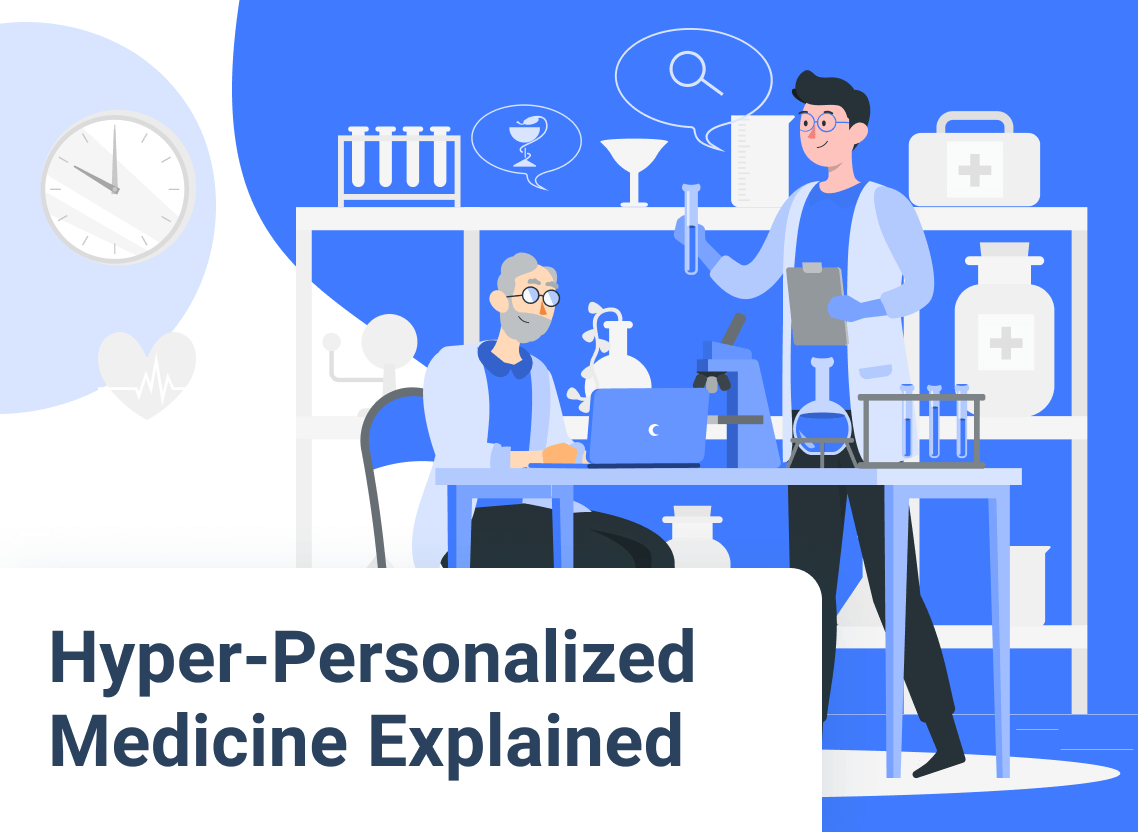
Want to know more? — Subscribe
In the era of rapidly developing technologies, the healthcare industry adopts new approaches regularly. NLP, or Natural Language Processing, is one of them.
Natural language processing in healthcare is widely used, as well as usage of NLP in other industries. Recent studies predict that the NLP market will grow 14 times till 2025. To compare: in 2017, $3.2 billion, in 2021 — $17.6 billion, and the prediction for 2025 is $43.3 billion.
Natural language processing in the healthcare industry presupposes AI (artificial intelligence) usage : voice-activated assistant or platform for speech recognition. However, the healthcare industry has a very specific language. Therefore it's impossible to use any of the existing NLP apps, like Siri.
David Talby, CTO at John Snow Labs, says, 'These systems are harder to build than some of the first computer vision deep learning applications… — they require a broader general and medical knowledge, handle a bigger variety of inputs, and must understand the context.' Therefore, NLP in the healthcare industry requires a very personal approach.
The benefits of NLP for healthcare deserve the effort. Medical natural language processing helps automate paperwork, organize research, conduct analysis for disease investigation, and much more.
In this article, we provide you with a comprehensive overview of natural language processing, the role of NLP in healthcare and explain how AI can become the most effective solution for this industry.
Additionally, we will talk about the best use cases of NLP implementation in the medical industry and prove that any organization can start enjoying the benefits of AI now.
What is NLP in Healthcare and How Does It Work?
The first question we need to answer before discussing this technique is what NLP is.
Natural language processing works on the crossroad of computer science, linguistics, and artificial intelligence. The system uses several techniques: speech recognition, natural language understanding, and natural language generation. The provider of any natural language processing software for healthcare must use these three techniques for a successful user experience and business implementation.
Uses for natural language processing in healthcare are various. Still, all of them decrease the separation between the abilities of a human and a machine. Besides, for any company, the processes behind NLP in the medical field are the same.
Healthcare NLP tools work with semantic and syntax. Any NLP tool must understand the meaning of the word, put it into the context of the sentence, and analyze how the words are connected. Simply put, the system should recognize the speech. However, it is not enough. The next step is to recreate the speech and generate new text.
How Does NLP Help the Healthcare Industry
How can natural language processing help doctors? The significance of NLP for healthcare is evident: different types of models and algorithms, ability to train every model, scalability, and many others.
According to Statista, 45% of users consider state-of-the-art accuracy the most important criteria in NLP for healthcare.
Healthcare natural language processing helps solve urgent industry problems as well. According to the Connected Content Better Healthcare report, 80% of healthcare documentation is unstructured. It causes problems with information processing and recognition.
However, this is not the only problem natural language processing solves. By examining natural language processing use cases in healthcare, we defined 3 basic issues NLP can solve for the healthcare industry.
Improving clinical documentation
The poor electronic health record is a problem area for the healthcare industry. Data integration, reception, distribution, and funding: metrics are stumbling blocks for hospital interoperability. According to 56% of healthcare leaders, managing this information is a key obstacle to improving interoperability.
Supporting clinical decisions
Applying natural language processing to healthcare is one of the basic steps to simplify making clinical decisions. Any doctor or physician would say that lack of information harms diagnosis and treatment. Currently, 66% of unstructured data is not available for patient care decisions.
With the rise of predictive virtual technologies, the situation can improve.
Information extraction
Information extraction can improve the state of healthcare greatly.
Information extraction from electronic health records (EHRs) is my favorite NLP technique for healthcare. The huge volume of unstructured patient data that is put into EHRs provides a great challenge for any single physician to analyze and get a comprehensive view of the patient history. By using information extraction techniques in NLP in the medical field, we can provide a comprehensive, easily accessible, and accurate history of the patient to the physician
Empowering health literacy
One of the least evident benefits of NLP in healthcare is the possibility of improving clients' health literacy. Of course, NLP techniques won't replace a real doctor, but they will help clients keep their health records and interact with chatbots for diagnostics instead of using Internet sources for medical treatment.
Identifying clients who need healthcare
Healthcare can change significantly with the active usage of NLP and AI. For example, the technologies can analyze the patient's background and decide on possible health problems the patient may have. This way, it will be possible to prevent diseases or diagnose them early to start on-time treatment.
NLP Techniques You Should Know
Certain techniques operate natural language processing technology in healthcare. They determine the effectiveness of the technology, its processes, and the result it helps to achieve.
In general, the techniques are common for different industries, as the principles of AI and NLP are the same. However, healthcare is a specific industry where the causes and effects may have dramatic outcomes. Therefore, even the development of a basic mobile application is challenging, and implementation of NLP requires a profound understanding of the industry and technologies.
Summarizing content
The volume of the content in healthcare is always extensive. However, it is important to keep it summarized and properly organized for further usage. Later on, it will help with analytics, as well as decision-making.
Mapping information components
We have already mentioned the importance of structuring content. Mapping information components is the technique that developers use to achieve the desired result. It will help to keep electronic health records organized and properly structured.
Converting information
Machine-coherent arrangements can hardly be used in their original form. However, NLP in the medical field can help with converting this information into a common language. As a result, the information is used for informational and educational purposes.
Engaging in optical character recognition
Any source of content contains images, PDF files, and other visual pieces of information. NLP, along with other AI tools, can turn them into content documents for further usage. It may serve as a tool for healthcare medicine.
Conducting discourse recognition
With the help of this technique, it becomes possible to transform any clinical data into content. It can simplify the processes and improve the performance of hospitals and clinics.
Best Use Cases of Natural Language Processing in Healthcare
Healthcare innovation is evident for any nurse or doctor. We all have already heard how natural language processing improves healthcare: implementing real-time chatbots or cost-effective tools for data management. Below are the examples of use cases of NLP in healthcare that prove that the future is already here.
Read Also: Virtual nurse app development guide
StructBERT NLP model
The role of NLP in healthcare during the COVID-19 pandemic became even more important. Therefore, Alibaba's DAMO Academy made a huge contribution to healthcare data analysis.
StructBERT is a model that is used by the Centers for Disease Control in China. It helps analyze medical records and conduct an epidemiological investigation by understanding the context of words and leveraging structural information.
NLP model to detect risk patterns related to acquired infections
Sometimes, clinical notes and patient feedback have no sense. If the information is not used by hospitals, doctors, and researchers, it becomes useless. This particular model collects and structures data related to acquired infections.
The information helps to identify the signs of infection in the early stages.
Chatbots
Chatbots are among the least complicated tools for communication used in the healthcare industry. However, with the help of artificial intelligence and NLP, modern hospitals have managed to upgrade communication and turn chatbots into assistants.
Modern technologies help to use healthcare natural language processing in diagnostics. For example, a client enters the symptoms. Then, the algorithms analyze them and use this information for diagnostics.
Natural Language Processing in Healthcare: the Technologies of the Future
The state of technologies in healthcare implies active usage of AI and NLP. The latest studies show that 65% considered artificial intelligence to have the most impact on health care.
We at Softermii are also sure: the healthcare industry is changing rapidly as the role of technologies changes. We support these improvements and believe software development will change the world. Currently, we are working with different healthcare and pharmacy companies. Our team helps them develop high-quality applications for better performance and business scaling.
If you are ready to make these improvements now, contact us! We will gladly help you with software development of any size or complexity. Professional engineers with expertise in different industries will help you with the realization of the most challenging ideas.
Let's change the world together!
Frequently Asked Questions
How can natural language processing benefit doctors?
The most important application of NLP software for doctors is that you can scan clinical texts. This frees up a lot of time for doctors and medical staff, which can be spent on more complex and important tasks.
How can natural language processing improve patient diagnosis?
NLP in medicine has been able to improve the processes and outcomes of treatment through the interpretation of clinical records. This allows details to be extracted from diagnostic reports and letters from physicians and healthcare professionals, ensuring a complete and accurate patient health profile.
How difficult is it to implement NLP for medicine?
NLP systems in healthcare are very complex. Their implementation and implementation takes a lot of time, and developers with real experience in implementing such projects should really do this.
How about to rate this article?
324 ratings • Avg 4.6 / 5
Written by:
























